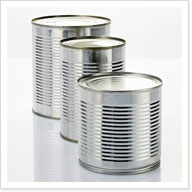
Canning is an important and safe method for preserving food. Manufactured canned foods like sauces, beans, lentils, pastas, tuna, vegetables and fruits are pantry staples. Canned and jarred items have long shelf lives, but food safety rules still apply. Read on to learn more about keeping foods safe on your kitchen shelves.
How is food canned commercially?
Jars or cans are heated to a temperature high enough to destroy the microorganisms that could cause food spoilage and/or foodborne illness. The heating process also removes air from the product and creates a vacuum. This vacuum helps prevent recontamination by harmful microorganisms.
Choosing canned foods
When you’re choosing canned or jarred products, take a moment to check the quality of the packaging. Do not purchase jars or cans that are dented, leaking, cracked or have bulging lids. Avoid cans that are dusty or have torn labels – this may mean that they have been sitting on the shelf a long time.
Storage
Practice the FIRST IN, FIRST OUT rule. When stocking your pantry, bring older foods to the front and newer purchases to the back.
Food manufacturers generally recommend that canned goods be stored for no longer than one year for best quality. Tomato products, canned fruits and other high acid foods should be used within 18 months. Low-acid foods (such as canned vegetables) have a shelf-life of 2-5 years.
For the best quality canned food, store in a cool and dry place – not near pipes, the stove or range, a furnace or in direct sunlight. Keep cans dry to avoid the metal lids from rusting. Rust can cause leaks and food spoilage.
Properly stored canned foods will almost always be safe to eat. However, do not eat foods from cans that show these warning signs:
-
Bulging
-
Leaking
-
Denting at the seam or rim (which can allow air or harmful bacteria to enter the can)
Foods that don’t look spoiled can still have bacteria that can make you sick. When in doubt, throw it out!
Most canned or jarred foods will need to be refrigerated after they are opened, though some items like peanut butter, spices and vinegar will be fine in your pantry. Follow the storage instructions that are on the label.
For foods that need to go into the fridge, transfer the contents to an air-tight plastic or glass container. Once opened the quality and safety of the refrigerated foods will begin to decrease. Most products should be used within 2-3 days. Tomato sauces and fruits should be used within 5-7 days.
Food labeling – What do all those numbers mean?
Canned goods have a long shelf life, which means that they don’t require a “best before” date. Only foods that have a shelf life of 90 days or less (such as perishable foods like milk and cheese) must have a best before date.
A “best before” date is a way of expressing the durable life of a product. The durable life is described as the number of days (starting with the day the food is packaged) that the food will keep its quality, taste and nutrition – as long as it’s stored properly.
It is important to note that the “best before” or “durable life” date measures the quality of the food – not the food safety. It is the manufacturer that ultimately decides on the durable life of the foods that they produce and sell.
Even though canned foods don’t require a “best before” date, there are still lots of numbers on the top, sides and bottom of the package that may be confusing. Most canned foods are marked with a coded date of manufacture – this can be something that looks like a date or a series of numbers. This usually identifies the date the item was produced or packaged. Don’t confuse it with a best before date unless you see “best before” or “BB” before a date. These numbers are meant to be useful to the manufacturer and not the consumer. If you want to know when a food was produced or have questions about its shelf life, call the manufacturer (you will usually find the number on the label of the packaged food).
For more on food safety and storage:
Food Safety – True or False
Safe Food Storage
Plastic Safety FAQs
Food Safety Network, for food safety information call toll-free 1-866-503-7638
Canadian Food Inspection Agency
Canadian Partnership For Consumer Food Safety Education
Last Update – June 3, 2015